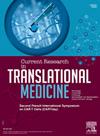Optimized GMP-grade Wharton’s jelly’s mesenchymal stromal cells manufacturing and administration protocol for Graft versus Host disease prevention
IF 3
4区 医学
Q2 MEDICINE, RESEARCH & EXPERIMENTAL
引用次数: 0
Abstract
Background
Wharton's jelly mesenchymal stromal cells (WJ-MSCs) are multipotent cells derived from the umbilical cord with immunomodulatory properties, making them a promising candidate for cell-based therapies targeting immune-related diseases. Herein, we aim to optimize the conditions of use of clinical-grade WJ-MSCs manufactured according to Good Manufacturing Practice (GMP) for the prevention of graft versus host disease (GVHD) in a preclinical xenogeneic GVHD mouse model.
Methods
GMP-compliant WJ-MSCs were primed with IFN-γ and assessed in vitro for their immunosuppressive capacity using coculture assays with activated human T cells. To evaluate in vivo efficacy, NSG mice were sub-lethally irradiated (2 Gy) and transplanted with human peripheral mononuclear cells, then treated with one or more injections of IFN-γ-primed or unprimed WJ-MSCs, to assess xeno- GVHD and its severity.
Results
GMP-produced WJ-MSCs suppressed T-cell proliferation in vitro and IFN-γ priming enhanced this effect, largely through Indoleamine 2,3-dioxygenase (IDO) activity. In vivo, three weekly injections of IFN-γ-primed WJ-MSCs significantly improved survival and reduced histological GVHD scores in the liver and skin of recipient mice.
Conclusion
These findings demonstrate that IFN-γ-primed GMP-grade WJ-MSCs effectively prevent GVHD in preclinical models, and support their use in optimized dosing regimens for future clinical testing. Given their enhanced immunosuppressive efficacy, they also hold promise as a therapeutic option for established and treatment-refractory forms of GVHD.
优化gmp级华氏果冻间充质间质细胞制造和给药方案,预防移植物抗宿主病
wharton’s jelly mesenchymal stromal cells (WJ-MSCs)是一种来自脐带的多能细胞,具有免疫调节特性,使其成为针对免疫相关疾病的细胞治疗的有希望的候选细胞。在此,我们的目标是优化临床级WJ-MSCs在临床前异种GVHD小鼠模型中用于预防移植物抗宿主病(GVHD)的使用条件。方法采用IFN-γ对符合sgmp的WJ-MSCs进行诱导,并与活化的人T细胞共培养,评估其体外免疫抑制能力。为了评估体内效果,将NSG小鼠进行亚致死照射(2 Gy)并移植人外周单核细胞,然后注射一次或多次IFN-γ引物或未引物的WJ-MSCs,以评估异种GVHD及其严重程度。结果gmp产生的WJ-MSCs体外抑制t细胞增殖,IFN-γ启动主要通过吲哚胺2,3-双加氧酶(IDO)活性增强这种作用。在体内,每周三次注射IFN-γ-引发的WJ-MSCs可显著提高受体小鼠的存活率,并降低肝脏和皮肤的GVHD组织学评分。结论IFN-γ引发的gmp级WJ-MSCs在临床前模型中可有效预防GVHD,并支持其用于未来临床试验的优化给药方案。鉴于其增强的免疫抑制功效,它们也有望成为已建立的和治疗难治性GVHD的治疗选择。
本文章由计算机程序翻译,如有差异,请以英文原文为准。
求助全文
约1分钟内获得全文
求助全文
来源期刊

Current Research in Translational Medicine
Biochemistry, Genetics and Molecular Biology-General Biochemistry,Genetics and Molecular Biology
CiteScore
7.00
自引率
4.90%
发文量
51
审稿时长
45 days
期刊介绍:
Current Research in Translational Medicine is a peer-reviewed journal, publishing worldwide clinical and basic research in the field of hematology, immunology, infectiology, hematopoietic cell transplantation, and cellular and gene therapy. The journal considers for publication English-language editorials, original articles, reviews, and short reports including case-reports. Contributions are intended to draw attention to experimental medicine and translational research. Current Research in Translational Medicine periodically publishes thematic issues and is indexed in all major international databases (2017 Impact Factor is 1.9).
Core areas covered in Current Research in Translational Medicine are:
Hematology,
Immunology,
Infectiology,
Hematopoietic,
Cell Transplantation,
Cellular and Gene Therapy.
 求助内容:
求助内容: 应助结果提醒方式:
应助结果提醒方式:


